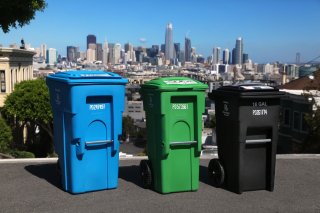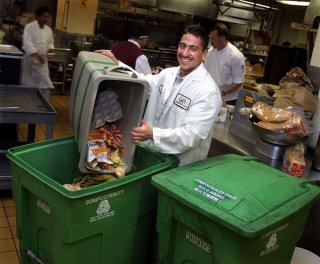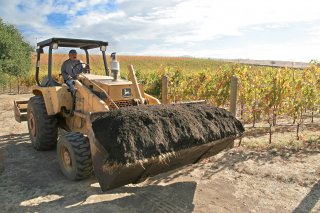Zero Waste Case Study: San Francisco
Partnership
In 2002, San Francisco adopted a goal of 75% diversion by 2010 and a long-term goal of zero waste. It exceeded the first goal two years early, soon recovering over 80% and cutting its disposal in half. The city initiated its Environment Code in 2003 based on the Precautionary Principle. It adopted a Construction and Demolition Debris Recovery Ordinance in 2006 requiring the recovery of C&D materials.
The city's Mandatory Recycling and Composting Ordinance, passed in 2009, requires everyone in San Francisco keep recyclables, compostables and trash separated. In 2018, San Francisco updated its zero waste commitments to reducing solid waste generation 15% and disposal to landfill or incineration again 50% by 2030.
In 2018, the Commission on the Environment also adopted a resolution (pdf) outlining the Department of the Environment's commitment to racial equity and announcing its Racial Equity Initiative. The City and County of San Francisco recognized the need for a cohesive and coordinated approach to addressing racial inequities and, in 2019, adopted an ordinance (pdf) creating an Office of Racial Equity and mandating departments develop Racial Equity Action Plans.

San Francisco implemented an innovative three-stream citywide residential and commercial collection program, with separate bins and a full range of size and frequency options, for commingled recyclables; compostables, including all food scraps, soiled paper and plant trimmings; and any remaining trash. Outreach uses lots of images and is done in Chinese, Spanish and other languages with customer service being able to communicate in almost any language.
Zero Waste… is the highest and best use of resources--eliminating waste throughout the product lifecycle where nothing goes to landfill or high temperature destruction. We create policies and programs that prevent waste and promote recycling and composting. SF Environment is doing all we can to make zero waste a reality.

The city implemented the first and largest urban food scraps composting collection program in the U.S. serving essentially every generator. San Francisco has collected more than two million tons of material and turned it into compost used by local orchards, vineyards and farmers.
San Francisco continues to develop and implement innovative initiatives including:
- Climate Action Goals and Planning (pdf)
- Checkout Bag Charge and Recyclable or Compostable Pre-Checkout Bag Ordinance
- Polystyrene Foam and the Food Service and Packaging Waste Reduction Ordinance
- Plastic, Litter, and Toxics Reduction Law
- Refuse Separation Law
- Customizable Sign Maker
- Disaster Debris Planning and Exercises

San Francisco actively participates in leading zero waste and climate organizations including the:
- California Resource Recovery Association
- C40 CITIES
- Carbon Neutral Cities Alliance
- Bay Area Deconstruction Workgroup
- Pacific Coast Collaborative, and
- West Coast Climate and Materials Management Forum
Contractual Agreement
San Francisco has a unique long-term refuse (recyclables, compostables and trash) ordinance where the city sets rates. The ordinance created a permit system to collect refuse for a charge and over time Recology acquired all the permits. The service provider develops infrastructure and provides collection, processing and reporting. The city provides direction and oversight. Most outreach is coordinated. To ensure success, San Francisco and Recology managers maintain regular communication and meet often to review operations, tasks and performance, and resolve any outstanding issues. A permit is not required to collect refuse with commercial value. Construction and demolition materials are not refuse and are governed by that ordinance.
Advantages
- Strong Leadership: Strong political leadership and staff expertise have resulted in innovative policy, programs and incentives with extensive outreach in all sectors.
- Continuity and Rate Setting Support Collaboration and Adaptability: Periodic rate applications fund infrastructure, operations and programs with evolving pay-as-you-throw rate structures and additional funding mechanisms between processes. This allows the city and service provider to work more collaboratively on programmatic development. Not conducting procurement processes or managing contracts facilitates long-term planning and adaptability. Overseeing essentially one primary service provider simplifies administration, communications, information gathering and reporting.
- Rewards Generators and Service Provider for Reducing Waste: Businesses and residences are incentivized to reduce generation, and recycle and compost, and Recology is incentivized to reduce disposal.
Disadvantages/Omissions
- Dependent on Ratemaking Process: The ratemaking process is very complex, time consuming and resource intensive.
- Limited Competition: The refuse ordinance restricts competition on refuse without commercial value but has delivered efficient, leading zero waste programs.
